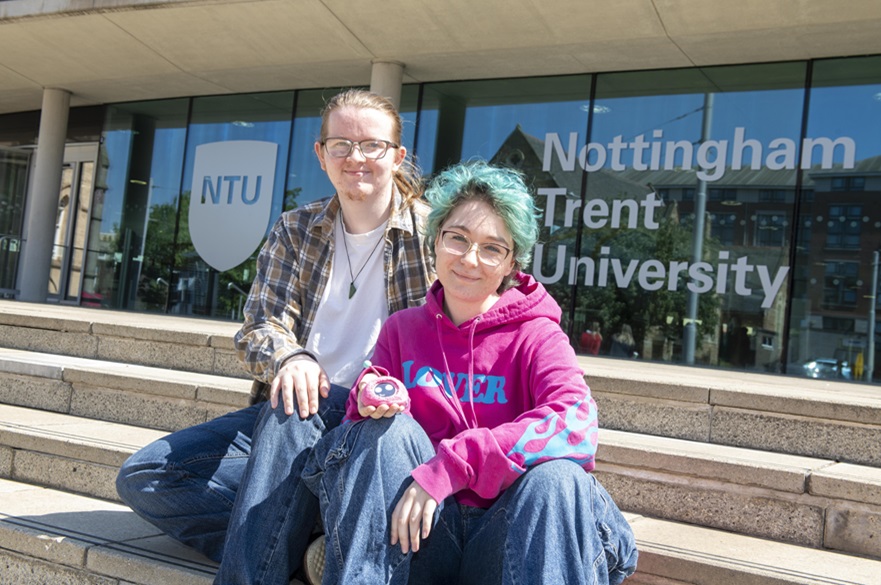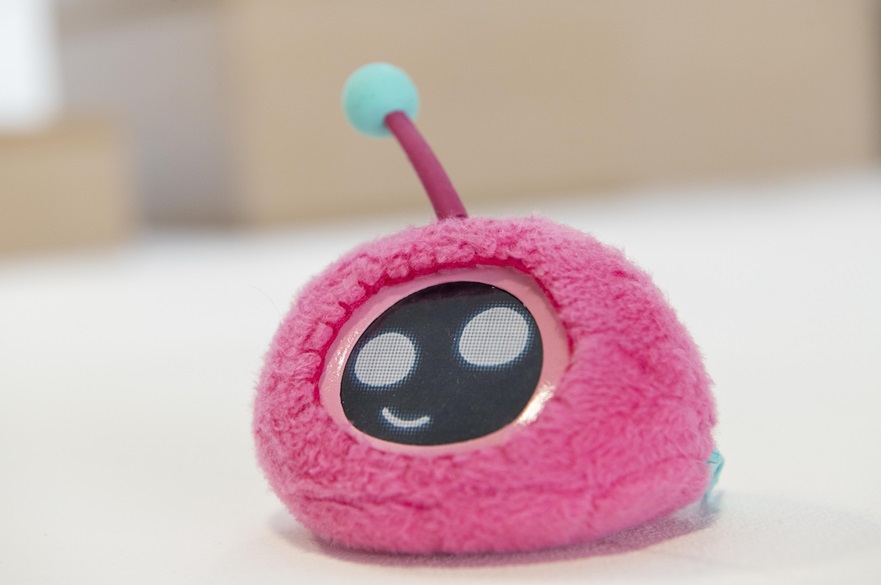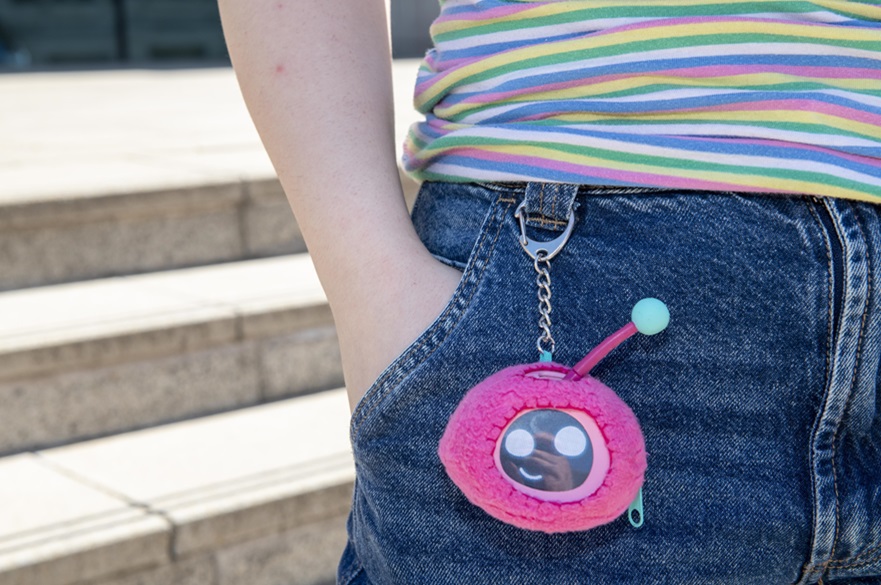Device uses psychology to help neurodivergent people with everyday tasks
By Chris Birkle | Published on 5 June 2025
Categories: Press office; School of Architecture, Design and the Built Environment;

People who are neurodivergent could benefit from a new device created by a Nottingham Trent University (NTU) undergraduate which uses psychology to help them complete day to day tasks.
Lia Kamenova, 22, created the ‘Buddy Double’ to help people, like her, who struggle with procrastination and executive dysfunction.
She was inspired by her own experiences and those of her partner, Matthew Wroe, 22, who is autistic, and spotted a gap in the market for young neurodivergent adults.
Her design aims to replicate the supportive effects of body doubling - a strategy widely recognised within the neurodiverse community as one that aids task initiation, enhances focus, and reduces overwhelm.
This approach is particularly helpful for individuals with executive functioning challenges, such as autistic people and those with ADHD.
Research shows that people with ADHD may experience challenges with self-regulation when working alone. The presence of another person (a ‘body double’) can offer a sense of shared focus, accountability, and external structure, which can support task engagement.

A close-up of Buddy Double
“My partner and many of my immediate circle of friends are neurodivergent - we all struggle with executive dysfunction, although in different ways,” said Lia, originally from Plovdiv in Bulgaria, who is studying BA Product Design in the School of Architecture, Design and the Built Environment.
“Many people find everyday tasks unexpectedly difficult – especially when managing executive functioning challenges, where even the simple routines can feel overwhelming.
“You don’t have to be neurodivergent to struggle with this – anyone can find care tasks overwhelming, especially during times of stress and exhaustion. It’s completely valid to struggle – and that’s exactly where Buddy can help.
“I wanted to create something that makes everyday tasks feel lighter, eases the pressure and brings friendliness through playfulness. For me, this project is about showing how play can make daily life feel more doable and joyful.”
The Buddy Double is a palm-sized, friendly digital companion. Its design draws on Gen Z’s affection for technology, nostalgia, and all things cute - echoing the charm of iconic toys such as the Furby and Tamagotchi.
A flexible stem on top of its head wags back and forth in response to voice-activated commands, mimicking a dog’s tail to create a sense of warmth and encouragement.
It can be programmed with a user’s daily care tasks and can provide reminders through visual and auditory cues such as movement and beeping. When it’s time to complete a task, it grabs the user’s attention by wagging its stem and making a small noise after which it displays an animation relevant to the activity, such as a ‘thirsty face’ when it’s time to drink water.

Buddy Double being worn on a pair of jeans
Once a task is completed, the user can track their progress via the accompanying app, unlocking digital rewards called ‘Buddy Bucks’ which they can exchange in-app to customise their Buddy Double’s facial features.
The aim is to incentivize people to use the physical device rather than just the app, encouraging engagement without relying on a smartphone.
“We use our phones for everything – organising, connecting, even coping - but constant engagement can be exhausting. Buddy Double offers a playful way to stay on track without screens, gently easing phone dependence and encouraging more mindful, less overwhelming daily routines.”
The device connects to smart devices via Bluetooth and responds to its name, which can be set by the user.
Made with a hard acrylic outer casing and a soft silicone stem, it is designed to be customizable and users can personalise their Buddy Double with interchangeable stems and fabric costumes to truly make it their own.
The device features three task modes suited to different needs:
- Finite Tasking: For short, fixed-time tasks like brushing teeth, which are checked off automatically in the app - this can help users with working memory difficulties remember their routine or completed tasks
- Timed Tasking: Ideal for users who struggle with time blindness, it provides a visual countdown using its moving stem
- Infinite Tasking: For open-ended activities such as washing dishes, users verbally start and end tasks with ‘Buddy’, let’s wash dishes together’ and ‘Okay Buddy, all done.’ This mode allows users to task for as long as they can, which can improve motivation by letting the user tap out of the task when needed, not necessitating completion.
Lia’s design is set to go on show for the 2025 NTU Student Showcase, which is one of the largest displays of graduating art and design talent in the UK.
Max Pownall, course leader of BA Product Design at NTU, said: “Lia has taken her personal experiences used them to create a product which could benefit thousands of people who are neurodivergent.
“She has created a unique product which harnesses the benefits of cognitive behavioural therapy to help improve people’s lives by empowering them to overcome low motivation and enhance their productivity.”
Notes for Editors
Press enquiries please contact Chris Birkle, Public Relations Manager, on telephone +44 (0)115 848 2310, or via email.
Nottingham Trent University (NTU) has been named UK ‘University of the Year’ five times in six years, (Times Higher Education Awards 2017, The Guardian University Awards 2019, The Times and Sunday Times 2018 and 2023, Whatuni Student Choice Awards 2023) and is consistently one of the top performing modern universities in the UK.
It is the 3rd best modern university in the UK (The Times and Sunday Times Good University Guide 2023). Students have voted NTU 1st in the UK for student employability (Uni Compare 2025)
NTU is the 5th largest UK institution by student numbers, with over 40,000 students and more than 4,400 staff located across six campuses. It has an international student population of almost 7,000 and an NTU community representing over 160 countries.
NTU owns two Queen’s Anniversary Prizes for outstanding achievements in research (2015, 2021). The first recognises NTU’s research on the safety and security of global citizens. The second was awarded for research in science, engineering, arts and humanities to investigate and restore cultural objects, buildings and heritage. The Research Excellence Framework (2021) classed 83% of NTU’s research activity as either world-leading or internationally excellent.
NTU was awarded GOLD in the national 2023 Teaching Excellence Framework (TEF) assessment, as it was in 2019.
NTU is a top 10 for sport (British Universities and Colleges Sport league table 2023).
NTU is the most environmentally sustainable university in the UK and second in the world (UI Green Metric University World Rankings, 2023).